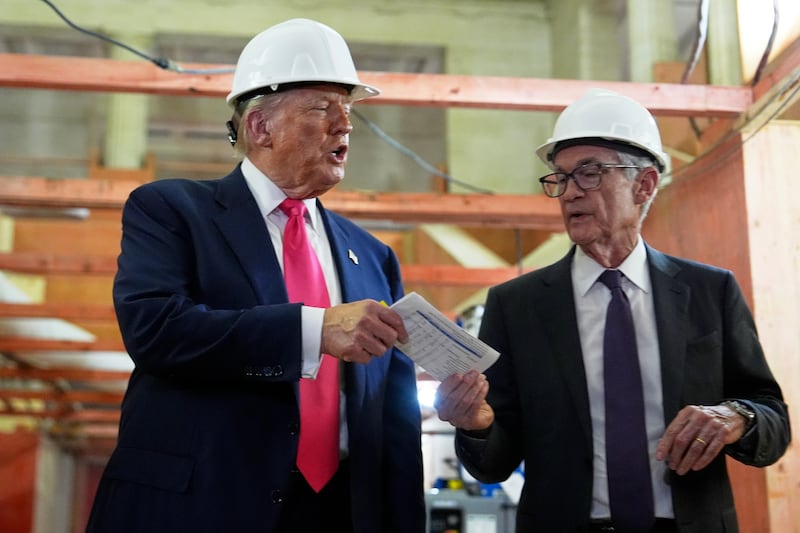- Fed Chairman Jerome Powell focused on policy and didn't mention President Trump in a Friday speech.
- Powell noted rising weakness in the U.S. job sector and signaled a possible September rate cut.
- The Dow Jones Industrial Average and U.S. stock indexes were up after Powell's comments.
Embattled Federal Reserve Chairman Jerome Powell ignored the ongoing maelstrom of personal and institutional criticism leveled by President Donald Trump and his staffers in a Friday speech in Jackson Hole, Wyoming.
True to his well-established demeanor of calm and measured commentary on the work of the U.S. central bank, Powell focused on the body’s dual mandate of maximum employment and price stability while signaling, albeit softly, that an interest rate cut is on the table next month.
Powell said “downside risks” to the U.S. labor market are on the rise and noted job figures over the last three months, an average of 35,000 new positions per month, are down markedly from the 186,000 new jobs per month average in 2024, even as the national unemployment rate remains low, currently at 4.2%. He also underscored inflation issues and the impact of new trade tariffs on consumer prices, though noted that the full scope of tariff increases remained uncertain.
Powell said the Fed’s Open Market Committee will consider the full spectrum of economic data when it convenes for its next policy meeting and interest rate vote on September 16-17, but offered an oblique foreshadowing of a potential rate reduction.
“With policy in restrictive territory, the baseline outlook and the shifting balance of risks may warrant adjusting our policy stance,” Powell said.
Powell spoke at the influential Jackson Hole Economic Symposium for likely the last time as Fed chairman. His term expires May 2026. The invitation-only gathering brings together global financial leaders to discuss, debate and plan for the world’s economic future.

The hint of a coming rate cut sent stocks soaring Friday with the Dow Jones Industrial Average up 900 points shortly after Powell’s address, which marked the conclusion of the central bank’s annual economic forum at the Wyoming resort town.
Other U.S. stock indexes were in positive territory Friday with the S&P 500 up 1.6% and the Nasdaq Exchange up 1.8% around midday.
What’s behind Trump’s issues with the Fed?
Trump and his economic team, along with an array of GOP officials, have lambasted Powell and the Fed for leaving the monetary body’s benchmark interest rate unchanged since late last year.
While the Fed made three consecutive rate cuts at its final meetings of 2024, shaving off a total of 100 basis points, the 4.25% to 4.5% range has held steady since Trump began his second term. The president has argued that the current rate window is three points higher than where it should be.
Trump has delivered mixed signals on taking action against Powell, variably threatening to fire him or indicating he will wait until the Fed chairman’s term expires next year to name a replacement.

The president provided the gateway to Powell’s leadership position at the Fed, thanks to a 2017 presidential appointment that flew through the Senate Banking Committee and was confirmed by the full Senate in early 2018.
Powell, a Republican and former private equity executive, joined the Federal Reserve in 2012 and ascended to the chairmanship in 2018 via Trump’s appointment. Biden renewed Powell’s term in 2022, which runs through May 2026.
White House officials have also taken aim at other Fed members.
On Friday, Trump confirmed that he will fire Federal Reserve Governor Lisa Cook if she doesn’t step down first.
“What she did was bad, so I’ll fire her if she doesn’t resign,” Trump told reporters at the White House, per CNN.

Bill Pulte, director of the Federal Housing Finance Agency, alleged in a social media posting earlier this week that Cook had committed mortgage fraud by providing false information on a pair of loan applications in 2021, before she joined the Fed.
A search for Powell’s replacement also appears to be actively under way.
U.S. Treasury Secretary Scott Bessent is leading the effort on Trump’s behalf and potential appointees include current Fed governor Christopher Waller and Fed Vice Chair for Supervision Michelle Bowman; National Economic Council Director Kevin Hassett; former Fed governor Kevin Warsh; former St. Louis Fed president James Bullard; Dallas Fed president Lorie Logan; economist Marc Sumerlin and others.


